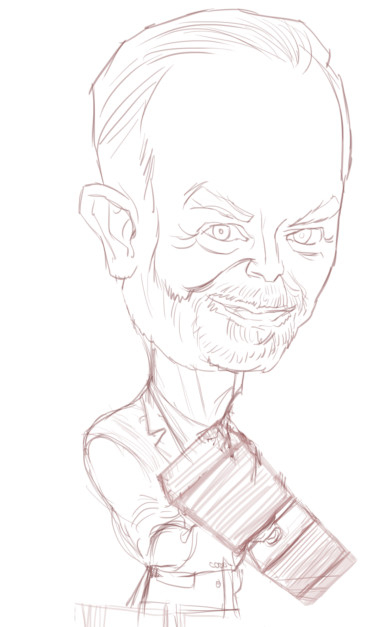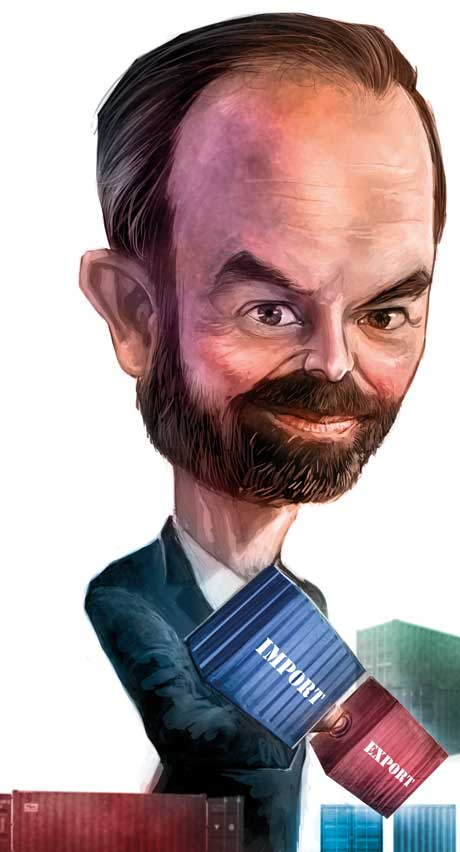Unless you’re an ardent student of French municipal politics — and I’m more-than-willing to confess here that I am not — you will most likely never have heard of Edouarde Philippe. I had not.
Until last Monday, the 46-year-old was the mayor of Le Havre, perhaps the most important port city on France’s English Channel coast. I will confess that I have been there, travelling on a car ferry, and it struck me as exciting a place as any other large port city with its share of run-down buildings, graffitied and shuttered shopfronts, and kilometres of bland dock-side land dedicated to containers, cranes and an assortment of ships.
Niño Jose Heredia/©Gulf News |
Le Havre’s fate rides on the trade that passes through its port at the mouth of the River Seine and from the rail and road links to Paris, about two hour’s drive to the southeast. And as mayor of Le Havre, Philippe must surely have known why global trade is important, how the French economy is dependent on the free movement of goods — both export and import — and on ease of transit for people. His port city has very regular ferry services to Portsmouth and Newhaven in the south of England, and to Rosslare in the southeast corner of the Republic of Ireland.
And as Mayor of Le Havre, Philippe will also be aware of the euro and how its ups and downs, and that of the United Kingdom’s pound, affect business in the large hypermarkets of his city as Britons choose to shop — or not — by the car or van-load for cheaper items such as wines and washing detergent. When Brexit fully happens, the phenomenon of cross-channel shopping will likely end in a morass of taxes, duties, visas and passport checks for non-European Union (EU) Britons.
So does all of this experience make him worthy to be the Prime Minister of France, hand-picked by the debutant resident of the Elysee Palace, President Emmanuel Macron?
The answer to that question partly lies in the political conundrum Macron is facing. He won the presidency on a centrist movement focused on his policies of stronger ties to the EU and a stronger euro. He’s fresh and vibrant, energetic and enigmatic, and handily defeated National Front leader Marine Le Pen in the run-off vote on May 7. He’s only 39, is an economist and, notably, defeated candidates from the mainstream French parties of the Socialists and Les Republicains to make the May 7 showdown. And therein lies his problem.
Just because the French elect a president doesn’t mean the job is done for Macron. Nope. There’s a small matter of winning a parliamentary powerbase for his En Marche! movement that’s built as a big tent, offering a third way, and is stealing any policies from Socialists, Les Republicains or others that will make France stronger, more productive and more efficient. And with French National Assembly (or parliamentary) elections — also in two rounds on June 11 and 18 — Macron needs to build on the momentum that swept him to the Elysee Palace PDQ — pretty-darn quick. Otherwise, without a majority in the 577-seat National Assembly, Macron will be as effective as fork when it’s raining soup.
And that’s where Philippe comes in. He comes from Les Republicains, the party that was headed by Nicolas Sarkozy until last year and whose candidate, Francois Fillon, was knocked out in the first round of the presidential election.
Philippe supported the moderate, centre-right former prime minister Alain Juppe, in the party’s presidential primary race last year
His appointment is a strategic move by Macron to destabilise the already-divided French Right and win over right-wing politicians to the En Marche! third way.
Macron, who served as economy minister under the Socialist former president Francois Hollande, has attracted dozens of centre-left MPs to his new movement and needed to reach out to the Right. The move was also calculated to lure parliamentary hopefuls from Les Republicains as a way of securing the seats needed to enact his manifesto promises to provide more flexibility for business.
Taking office at the grandiose prime minister’s residence of Le Hotel Matignon, Philippe stated pointedly: “I am a man of the Right,” but added that he respected politicians on the Left and was driven by “the greater good”.
His appointment is a blow to Les Republicains, who have been trying to regroup after the presidential vote and prevent defections to Macron’s camp.
Party officials insisted Philippe’s move was strictly a personal decision, but about 20 MPs broke ranks and issued a statement urging Les Republicains and centre-right allies to accept Macron’s “outstretched hand”, saying the Right needed to “take the full measure of the political transformation taking place before their eyes”.
Philippe was born in Rouen in Normandy, half way between Le Harve and Paris on the River Seine, and based his political career in the port, where his grandfather was a docker. The son of two teachers, he speaks German and spent part of his childhood in Bonn when his father was the head teacher of the French lycee. He comes from the same university background as Macron: He studied at Paris’s prestigious, political science institute, Sciences Po, then attended the exclusive Ecole Nationale d’Administration, the civil service graduate school seen as a factory of the French elite.
As a student, Philippe was briefly a social democrat activist within the French Socialist party before moving to the right. He has never held a government post and is relatively little-known outside his fiefdom in the north, which helps Macron present him as a new face as part of his promise to renew politics.
Philippe has veered between politics and the private sector, including working for an American law firm and holding a senior position at Areva, the French nuclear company.
So does all of this make him French prime-ministerial material? By June 11, Macron will have his first indication, and his answer a week later.
— With inputs from agencies











